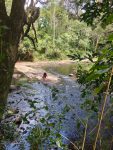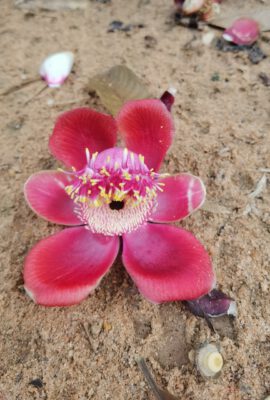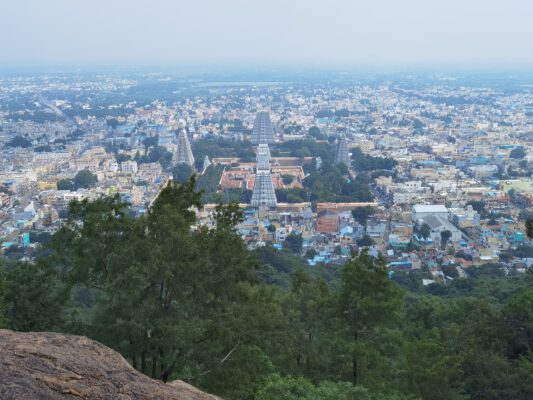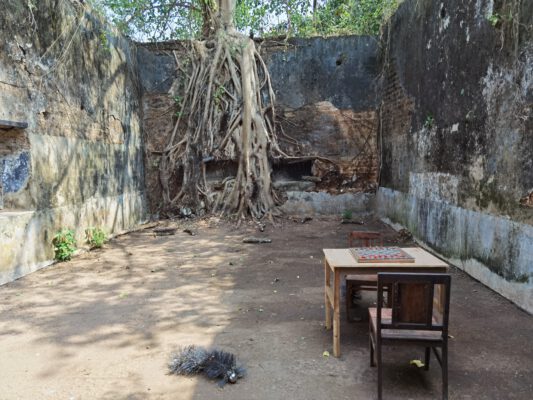Nhe other day, a friend told me how she had grown up in the Ashram School. Mirra Alfassa founded this school with a radical pedagogy. Children were free to choose what they wanted to learn and when. Very radical: although there was a timetable for languages, history, mathematics, philosophy, gossip, sport, etc., the kids could go wherever they wanted. And so each child got exactly what they needed for their own development. If a child needed gossip, then that was just the way it was, this need was then worked off and after a few weeks came an interest in philosophy or languages.... The school offered learning opportunities up to B. A., which was recognized by the state of India and is internationally transferable. This is still the case today, if I have understood correctly.
When Auroville wanted a school, the Aurovillians planned a school with an open curriculum. When the Aurovillians quite proudly asked Mirra Alfassa what she thought and what name she should give the school, she said somewhat reluctantly, "Last School". She didn't like schools.
And finally, it should be mentioned that Auroville sees itself as a 'living university', an open laboratory. When the idea of founding an Auroville University was often discussed here, there was a lot of resistance. The logic of degrees, a strict curriculum and specialist disciplines does not fit in with Auroville's self-image.
Humboldt ideal
This reminds me a little of my own student days in Germany. I studied before the Bologna Process, i.e. in a university system where I could attend all seminars freely. Nobody wrote down who came when. There were no assignments, sometimes there were written exams, but seminar papers were common in the humanities. If you wanted a certificate of achievement, you handed in a seminar paper. If it was good, it showed that you had dealt with the topic. It didn't matter how often you attended the seminar. And, of course, it wasn't a question of regurgitating the lecturer's material. The topic of the paper had to fit in with the general topic of the seminar, otherwise it was up to you. We called it the Humboldt ideal. Research and teaching were one and the same. Lecturers did research and shared their research process with the students. They learned the principle of research and wrote their own papers.
The intermediate examination demonstrated that you had familiarized yourself with a discipline. The master's thesis showed that you have now mastered the basic principles of research, i.e. research, argumentation, structure, expression - all embedded in a topic that attempts to provide an overview of a research question and formulate a research question. The doctoral thesis then shows that you are able to independently formulate a new question, to develop a question or a topic that has not been dealt with before. A habilitation documents that you have made a new contribution to an entire discipline.
This always seemed to me to be the ideal of free teaching. I don't think much of the Bologna Process - the American way of flexibly dividing the school and university system into management units according to credits, which in turn are standardized and therefore easily transferable between institutions and countries. I see the benefits for an education industry, but it has little to do with the human spirit.
Synthesis of yoga
Auroville is largely based on the idea of the synthesis of yoga. Sri Aurobindo has thus defined a concept that encompasses much more than the world of concepts. It is a teaching that is more than a school. It is about understanding human existence holistically and anchoring it in one's spirituality. The focus is on self-knowledge that goes beyond the self. The realization of the self that manifests itself in the world. It is about the question of consciousness, which can only be experienced in its purest form in meditation. Here, in meditation, i.e. in the radical reduction to one's own consciousness, is the seed of all knowledge. Only from here can we understand the world.
It is therefore crucial that young people are allowed to develop freely and are not over-formed from the outset with an abstract knowledge system that is not anchored in the reality of their lives, their own development and their own interests. Learning is an intrinsic urge of all people. We want to learn and grow, we do not have to be forced to do so. The fact that much of what is learned in a free environment does not fit into a capitalist value chain should not lead us to critically question this learning, but to question capitalism.
At the center of learning is therefore the knowledge of the self, nothing else, but this is all-encompassing. Here is the seed of the synthesis of yoga and a radical pedagogy. There is no room here for Bologna processes, but a free place to focus on what alone counts: the exploration of consciousness. The individual disciplines should only be based on this foundation. Everything else is alienated. Marx sends his regards, albeit from the other side of the seven rivers.
AUM








